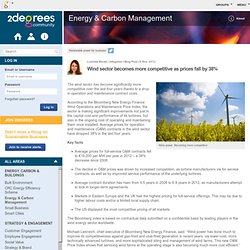

Chile Energy Auction Gives Bachelet a Success to Boast About. Peering into energy’s crystal ball. Back in 2007, McKinsey did two pieces of groundbreaking research that still inform how I think about energy—the resource-productivity framework and the greenhouse-gas cost curve (exhibit).
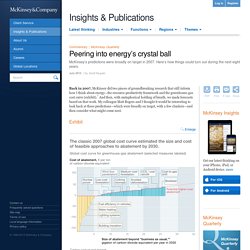
And then, with metaphorical holding of breath, we made forecasts based on that work. My colleague Matt Rogers and I thought it would be interesting to look back at these predictions—which were broadly on target, with a few clunkers—and then consider what might come next. Win some, lose some The 2007 research looked at a number of potentially disruptive technologies and assessed their prospects.
Here’s how we did: Solar. In all these areas, we got the direction right, but not the speed. Without venturing too deep into the geopolitical weeds, consider what happens to countries—such as Iran, Saudi Arabia, and Venezuela, whose economies rely heavily on fossil fuels—if demand for their oil peaks or growth slows. Why Tesla's battery for your home should terrify utilities.
Earlier this week, during a disappointing Tesla earnings call, Elon Musk mentioned in passing that he’d be producing a stationary battery for powering the home in the next few months.
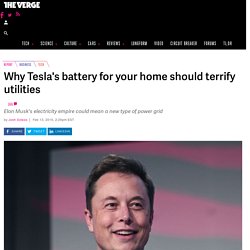
It sounded like a throwaway side project from someone who’s never seen a side project he doesn’t like. But it’s a very smart move, and one that’s more central to Musk’s ambitions than it might seem. To understand why, it helps to look not at Tesla, but at SolarCity, a company chaired by Musk and run by his cousin Lyndon Rive. SolarCity installs panels on people’s roofs, leases them for less than they’d be paying in energy bills, and sells surplus energy back to the local utility. It’s proven a tremendously successful model. When you have a lot of solar, you need a lot of batteries. Climatescope 2014 - Global study shows clean energy activity surges in developing world.
Why Google halted its research into renewable energy. Back in 2007, Google had a very simple idea for addressing global warming — we just need to take existing renewable-energy technologies and keep improving them until they were as cheap as fossil fuels.
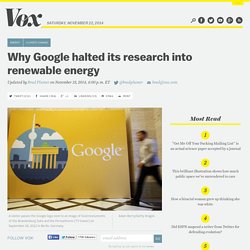
And, voila! Problem solved. Google realized its clean-energy project wasn't nearly ambitious enough That was the logic behind the company's RE-C project, which aimed to produce one gigawatt of renewable electricity for less than the price of coal. The hope was to do this within years, not decades. By 2011, however, Google decided that this energy initiative wasn't going to work out as planned and shut things down. World bank to focus future investment on clean energy. The World Bank will invest heavily in clean energy and only fund coal projects in “circumstances of extreme need” because climate change will undermine efforts to eliminate extreme poverty, says its president Jim Yong Kim.

Talking ahead of a UN climate summit in Peru next month, Kim said he was alarmed by World Bank-commissioned research from the Potsdam Institute for Climate Impact Research in Germany, which said that as a result of past greenhouse gas emissions the world is condemned to unprecedented weather events. “The findings are alarming. As the planet warms further, heatwaves and other weather extremes, which today we call once-in-a-century events, would become the new climate normal, a frightening world of increased risk and instability. The consequences for development would be severe, as crop yields decline, water resources shift, communicable diseases move into new geographical ranges, and sea levels rise,” he said. Oil price slump to trigger new US debt default crisis as Opec waits. Hinkley Point nuclear plant 'threatened by Areva financial crisis' The £25bn Hinkley Point project in Somerset is due to be built by a consortium led by French energy giant EDF Energy, with fellow French state-owned business Areva due to provide its EPR reactor technology and take a 10pc stake in the project.
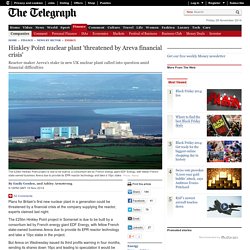
Steve Thomas, professor of energy policy at Greenwich University, claimed the company’s participation in Hinkley would be in doubt as a result. He told TheTimes: “Areva’s never going to be able to take 10pc”. The timescale for first power from Hinkley has been pushed back several years to 2023 but EDF claims it is confident in this revised timescale. The fears over Areva’s role follows days of speculation about the other partners in the Hinkley Point consortium. EDF has said it also plans to sell a combined stake of between 30pc and 40pc to two Chinese groups: China General Nuclear Corporation and China National Nuclear Corporation, and would also sell up to 15pc to other parties. EDF declined to comment. Wind Power Blows Away Coal and Gas in Nordic Countries. The Big Six are losing the plot - 02 Oct 2013. DECC publishes Renewable Energy Roadmap Update.
The Renewable Energy Roadmap Update released by the UK’s Department of Energy and Climate Change reveals that there has been strong growth in renewable electricity deployment over the last year.
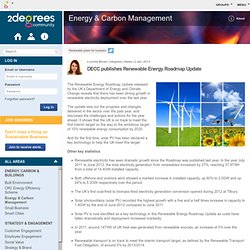
The update sets out the progress and changes delivered in the sector over the past year, and discusses the challenges and actions for the year ahead. It shows that the UK is on track to meet the first interim target on the way to the ambitious target of 15% renewable energy consumption by 2020. And for the first time, solar PV has been declared a key technology to help the UK meet this target. Other key statistics. Apple to follow Google into wind energy sector. Decentralised energy…the lost voice in the energy debate? Stephen Newman, technical director of MITIE Asset Management, explains why he believes decentralised energy could play a significant role in the years ahead.
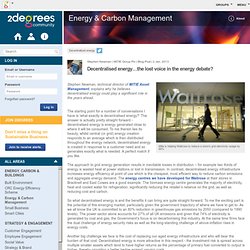
The starting point for a number of conversations I have is ‘what exactly is decentralised energy?’ The answer is actually pretty straight forward - decentralised energy is energy generated close to where it will be consumed. To me therein lies its beauty, whilst central (or grid) energy creation responds to an average which is then distributed throughout the energy network, decentralised energy is created in response to a customer need and so generates exactly what is needed. A perfect match if you like.
IEA slams 'epic failure' of global energy efficiency policy - 12 Nov 2012. Rio+20 and the Future of Clean Energy. By Doug Arent, Ph.D., Executive Director of the Joint Institute for Strategic Energy Analysis at the National Renewable Energy Laboratory In late June, the United Nations Conference on Sustainable Development was held in Rio de Janeiro, Brazil, two decades after its predecessor, the 1992 Earth Summit, was held to advance sustainable development through international cooperation.
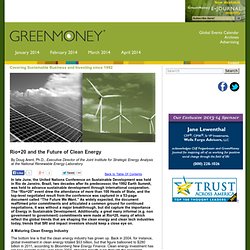
The “Rio+20″ event drew the attendance of more than 100 Heads of State, and the top-level negotiated result from the conference was captured in a 53-page document called “The Future We Want.” As widely expected, the document reaffirmed prior commitments and articulated a common ground for continued negotiations, it was without a major breakthrough, but did capture the importance of Energy in Sustainable Development. Wind sector becomes more competitive as prices fall by 38% The wind sector has become significantly more competitive over the last four years thanks to a drop in operation and maintenance contract costs.
